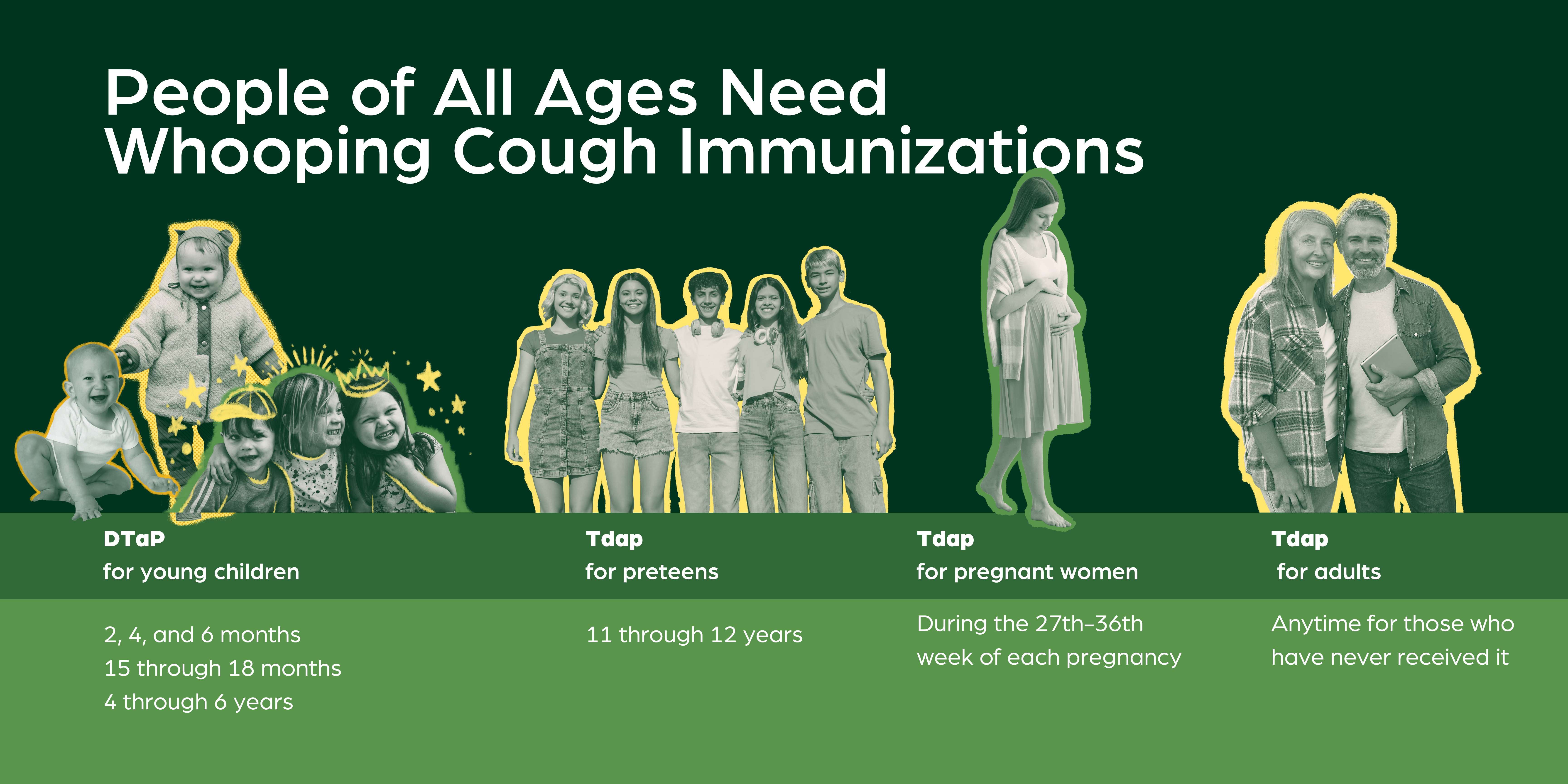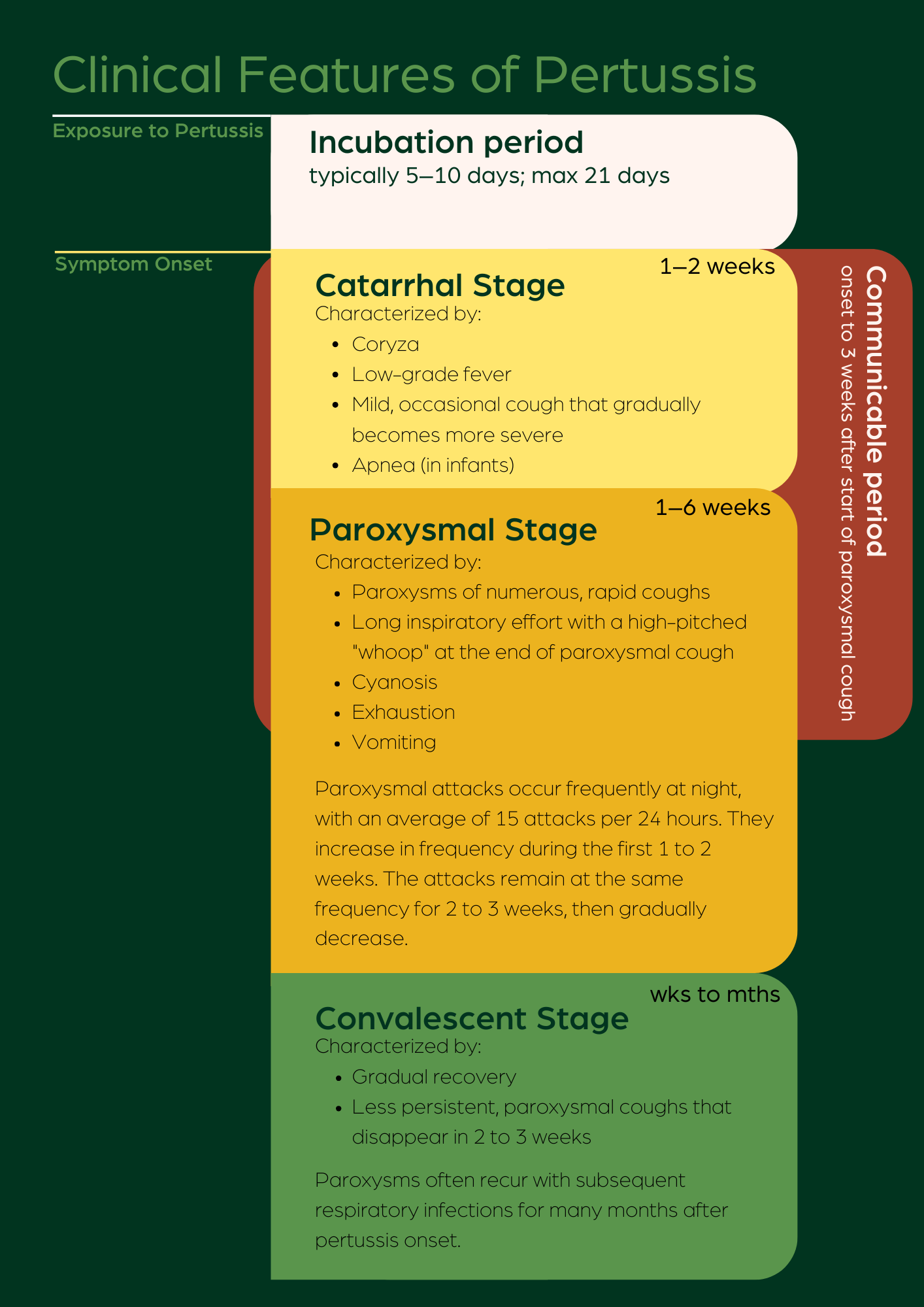WHITMAN COUNTY
Pertussis Outbreak Data
Last updated: February 12th, 2025
92
Current Case Count

General Information
What is Pertussis?
Pertussis (whooping cough) is a well-known and very contagious respiratory illness caused by the bacteria Bordetella pertussis.
How is Pertussis Spread?
Person-to-person spread of pertussis occurs through small drops of spit from your mouth or nose when you talk, cough, or sneeze. Spread is most likely among people who live together or people who spend time together indoors.
What are the Symptoms of Pertussis?
It begins with cold-like symptoms and develops into a bad cough.
Coughing spells can be severe, sometimes ending in gagging or vomiting. Some kids also may have a high-pitched “whoop” after they cough, which is how the disease got its common name. However, infants may not cough at all, and some teens and adults don’t have a “whoop” after they cough.
Complications of pertussis include pneumonia, syncope (passing out), seizures, apnea (stopping breathing), and death. Severe complications are most common in infants.
Who is at High Risk for Pertussis?
People at high risk for severe illness from pertussis:
- Infants under 1 year old are at greatest risk for severe disease and death.
- People with pre-existing health conditions that may be exacerbated by pertussis.
Those who will have contact with people at high risk:
- Pregnant women in third trimester: Women in their third trimester may be a source of pertussis to their newborn infant.
- Healthcare workers with direct patient contact.
- Family members or caregivers of infants or pregnant women.
Prevention
Wash Your Hands | Cover Your Cough & Sneeze
- Cover your mouth and nose with a tissue or elbow when you cough or sneeze. Throw away used tissues in the wastebasket right away.
- Wash your hands often with soap and water for at least 20 seconds. If soap and water are not available, use an alcohol-based hand sanitizer.
Stay Home When Sick and Limit Your Exposure to People Who are Sick
If you have respiratory symptoms and must leave home, please consider wearing a mask to prevent spreading small drops of spit from your mouth or nose when you talk, cough, or sneeze.

Immunization
Pertussis vaccines are effective, but not perfect. They typically offer good levels of protection within the first two years after getting the vaccine, but protection wanes over time. In general, DTaP vaccines are 80% to 90% effective.

DTaP Immunization
For infants and young children, this vaccine is given in a series of five doses (at 2, 4, 6, 15–18 months, and 4–6 years).
Tdap Immunization
Adolescents (11–12 years old) should receive the Tdap immunization, which provides continued protection against pertussis.
If you never received a Tdap booster as an adolescent, a single dose is recommended for adults.
Pregnant women are advised to receive the Tdap vaccine during the third trimester (between 27 and 36 weeks of pregnancy) for every pregnancy to protect newborns before they can receive their vaccinations.

Where Can I Get Tested for Pertussis?
There are tests available for pertussis through your doctor. PCR (Polymerase chain reaction) testing is currently the preferred test method for pertussis.
However, a negative test does not mean a person should stop treatment. The full prescription should be taken as directed by your care provider.

I Have Been Diagnosed With Whooping Cough (Pertussis) — Now What?
If you have been diagnosed with pertussis, early treatment with antibiotics can help reduce the spread of the disease to others. Close contacts of someone with pertussis may also be prescribed preventive antibiotics.
It’s important that you isolate until you have completed at least 5 days of antibiotic treatment or, if untreated, for 21 days from the onset of symptoms.
Isolation is essential to prevent transmission. Isolation means staying away from others and avoid going to work, school, or public places.
- Infants under 12 months of age and people with pre-existing health conditions that may be exacerbated by pertussis are at the highest risk of serious illness. Please take extra precautions to protect them from exposure.
If you need to seek healthcare or leave isolation for any reason before completing 5 days of antibiotics, please wear a mask to prevent spreading pertussis.
How Do I Know if I Am a Close Contact With Someone Diagnosed With Pertussis?
You are considered a close contact of someone with pertussis if:
- You live in the same household as someone with pertussis.
- You spent many hours together while they were symptomatic (e.g., cough, runny nose, low-grade fever, etc.). This could include being in the same room, household, or a confined place like a car.
Talk to your healthcare provider if you have been a close contact with someone diagnosed with pertussis.
Information for Health Care Providers
Actions Requested of Health Care Providers
Maintain a high index of suspicion for pertussis to identify those infected.
Please also consider pertussis in a respiratory illness of any duration in patients who have had contact with someone known to have had pertussis or symptoms consistent with pertussis.

If you suspect pertussis,
1. Test
Collect a nasopharyngeal (NP) swab for Bordetella pertussis PCR or culture. PCR is the most sensitive and fastest diagnostic test and is widely available at commercial laboratories.

2. Initiate treatment promptly
Do not delay treatment while awaiting results. CDC provides detailed treatment guidance.
3. Exclude
Tell the patient to stay home from work, school, or childcare.
Advise them that they are considered contagious until they have completed 5 full days of appropriate antibiotics.
4. Educate
Consider using WCPH's Pertussis Fact Sheet to help educate patients about pertussis and isolation recommendations.
5. Ask about close contacts
Consider preventive antibiotics for the entire household AND any close contact who meets “High Risk” criteria.
- Infants under one year old.
- Pregnant people, especially those in the third trimester.
- People who have a chronic respiratory illness.
- Family members or caregivers of infants or pregnant women.
Symptomatic close contacts should be treated as soon as possible and excluded from public activities until they have completed 5 days of antibiotics.
Asymptomatic close contacts and those taking preventive antibiotics do not need to be excluded from activities unless they develop symptoms.
Advise family members and close contacts who are not taking preventive antibiotics to return promptly if they develop symptoms within the next 21 days.
6. Report the illness to Whitman County Public Health within 24 hours.
We will conduct an interview with the patient to confirm isolation and treatment. We can also assist in determining recommendations for prophylaxis and exclusion.
7. Prioritize vaccination
Assure children and adults are up to date on pertussis-containing vaccines according to national immunization guidelines.

Information for School Health Personnel
We recommend schools have policies and procedures in place for:
- Tracking and managing staff, student, and volunteer vaccination records.
- Excluding staff and students who are diagnosed with pertussis.
- Implementing a parent notification system following an exposure. Call WCPH Disease Prevention at one of our office locations for a template letter.
- Tracking the number of student and staff absences due to similar symptoms or causes.
What to do when you have pertussis in your school?
For lab-positive cases,
- Report lab-positive cases to WCPH's Disease Prevention Program by calling one of our office locations.
- Exclude lab-positive case(s) from school until they have finished a 5-day course of antibiotic therapy.
- If a case has been diagnosed by a provider but the lab is pending, the most cautious approach would be to ask they remain out of school until the lab returns.
- If the case declines antibiotic therapy, WCPH will provide dates of exclusion based on symptom onset (usually 21 days after cough onset).
Identify & notify close contacts
- Work with WCPH's Disease Prevention Team to determine the infectious period and identify close contacts, especially contacts at high risk for severe disease.
- Notify by distributing a notification letter and WCPH Pertussis Fact Sheet to potentially exposed persons at a minimum
- Reach out to WCPH's Disease Prevention at one of our office locations if you would like to receive a template notification letter.
- In situations of pertussis outbreaks, send separate notification letters to each exposed classroom or cohort and consider posting pertussis information on your school website.
Monitor for the onset of symptoms in close contacts
- Notify teachers or coaches who have had a case in their class or in their sports team to refer other coughing children to the nurse’s office for evaluation.
- It is not currently indicated to exclude asymptomatic unvaccinated or under-vaccinated contacts.
- Continue monitoring symptoms in exposed individuals for 21 days from the last exposure.
Exclude symptomatic close contacts
- Close contacts that develop symptoms consistent with pertussis should be treated as cases.
- Refer them for medical evaluation, testing, and treatment, and exclude until they have finished a 5-day course of antibiotic therapy or, if case declines, after 21 days from their onset of cough or pertussis has been ruled out (requires a letter from healthcare).
- Report any excluded symptomatic contacts to WCPH Disease Prevention.
In an outbreak, expand screening
- School nurses seeing an increased number of students with a cough illness during a pertussis outbreak should be vigilant for students, staff, and volunteers with new symptoms and recommend evaluation by a healthcare provider.
Promote prevention
- Reinforce cough etiquette education and hand hygiene education to reduce the spread of illness in the school.
- Use standard precautions for cleaning: refer to the updated OSPI Disease Control Guide for safe cleaning and sanitizing recommendations in schools.
- Refer under or unimmunized children for vaccination. Appointments can be made for pertussis vaccination with the WCPH's Community Clinic online or by phone at one of our office locations.
